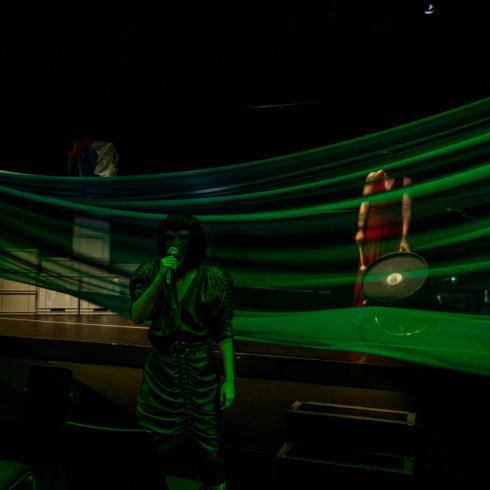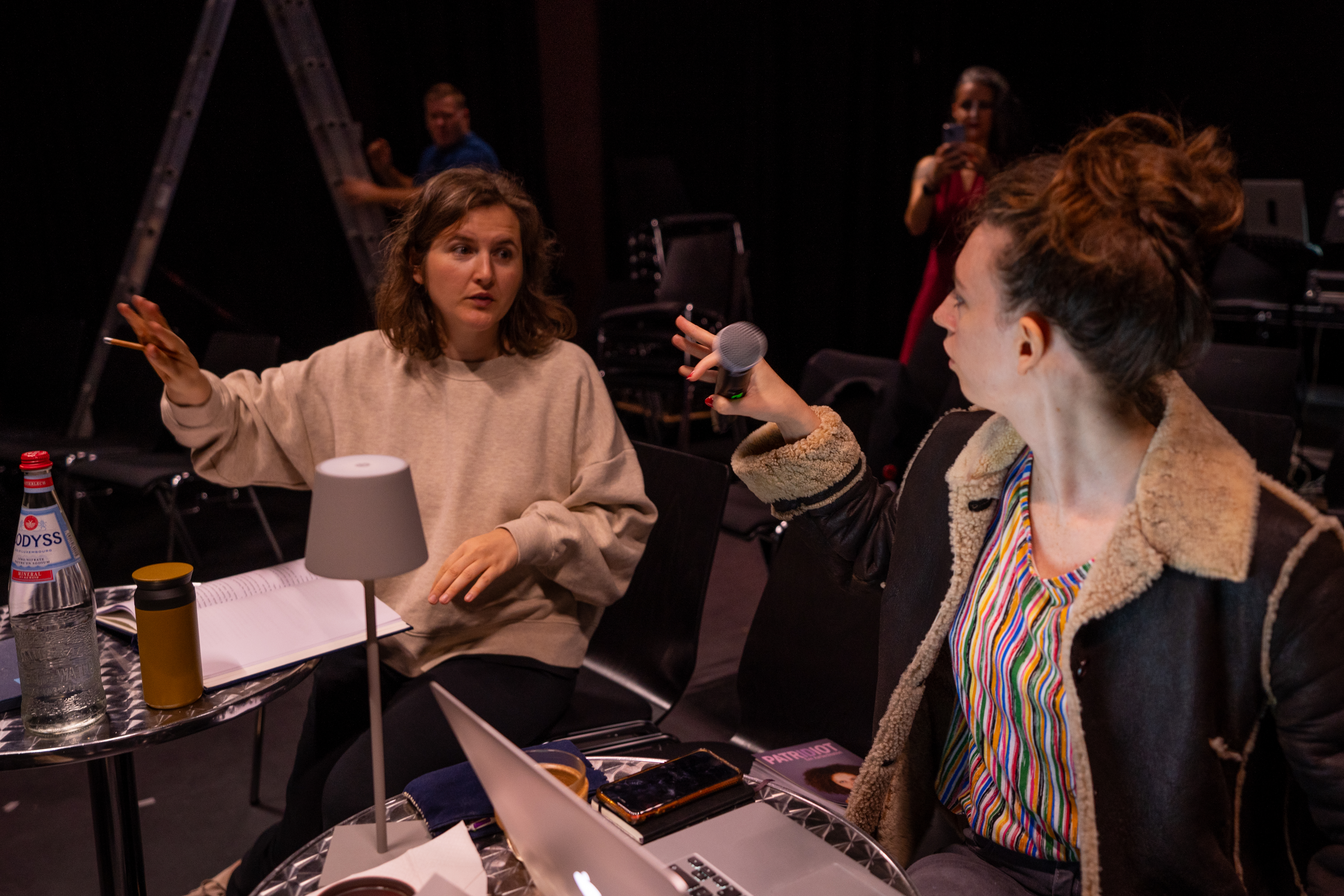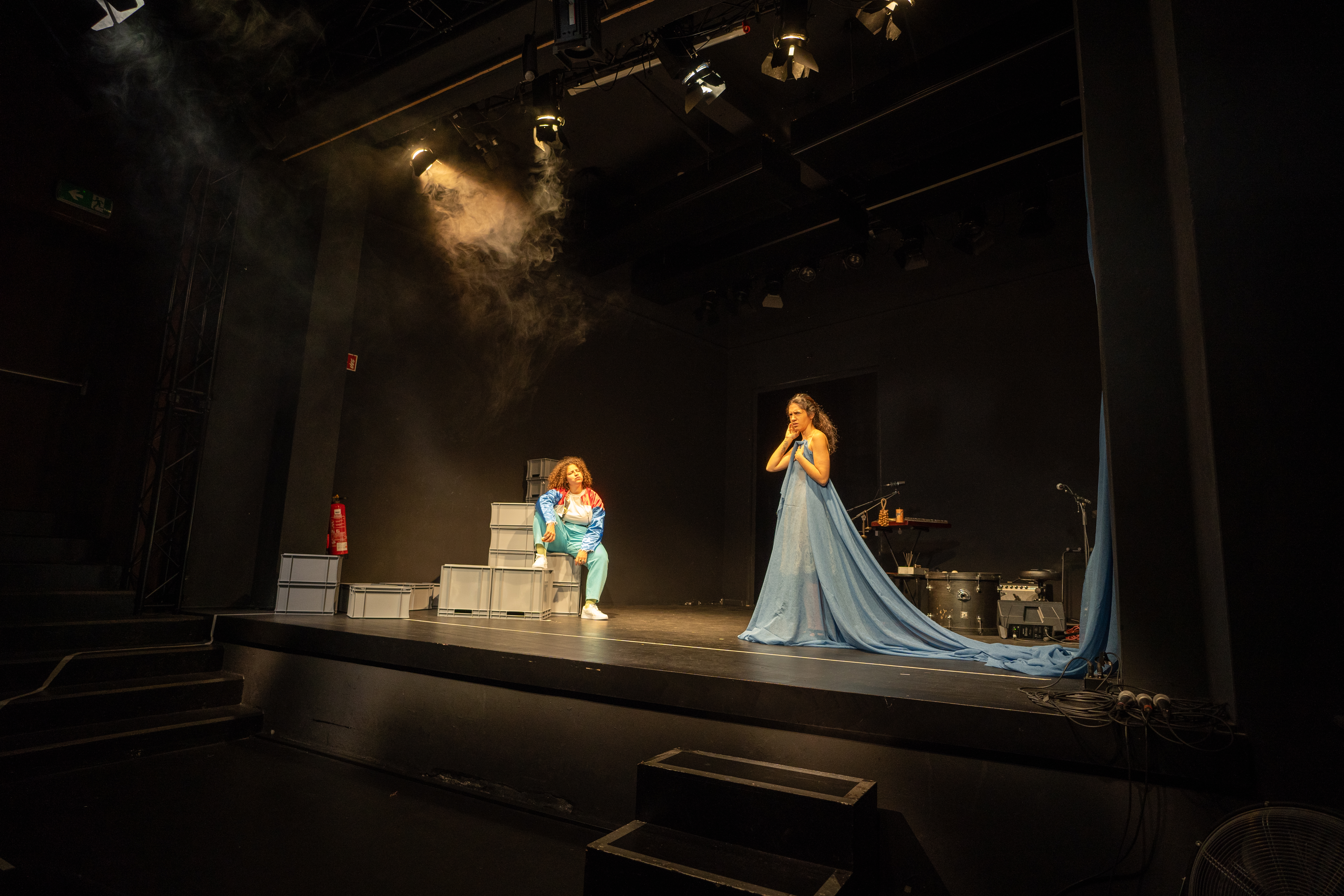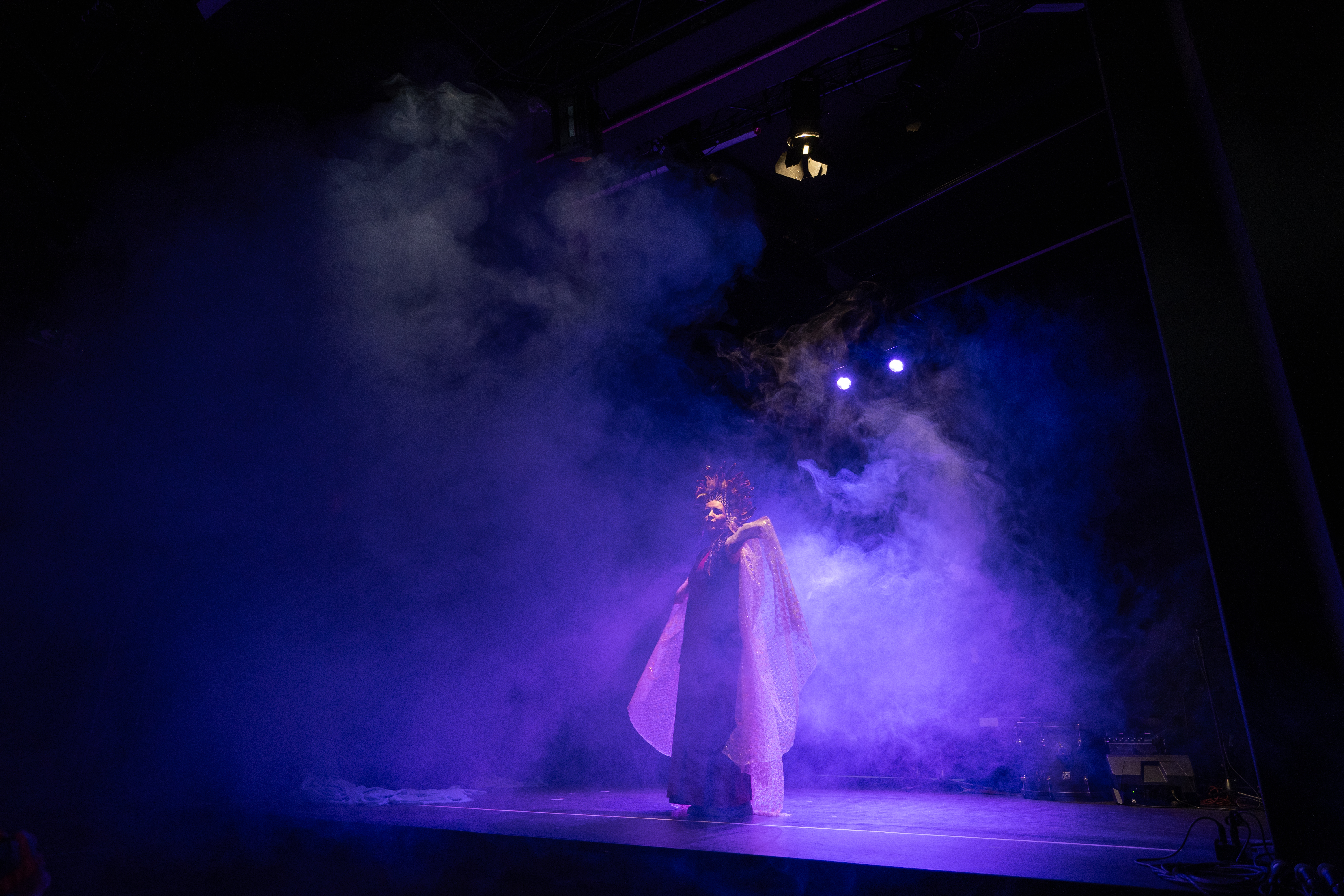09 oct. 2023PATRIDIOT at Kasemattentheater

Photo: PATRIDIOT. Een Aarbechtstitel, Kasemattentheater, © Sara Goerres
PatrIdiot. Een Aarbechtstitel at Kasemattentheater:
Debating Luxembourg
One peek in and one failed attempt to open the door later, the charming costume and stage designer Veronika welcomes me in, letting me know that the rehearsal is still ongoing. We then disappear behind the glass front of the Kasemattentheater.
I get assigned a seat at the rear end of the stage hall, forming, together with the dog of one of the actresses, the exclusive audience of the small extract of a stage play I'm about to witness. Three women are sitting in a triangle in the front of the stage, casually clothed and chatting, or, as I’ve later been told, exchanging stories about being an actress and being Luxembourgish and being both at the same time in the multicultural village that is Luxembourg.
Between a tipped-over table, a stepladder, and a clothes rack, the actresses are rehearsing in an ever-evolving coulisse with ever-transforming objects that form the significant props of the stories they tell. In the centre of attention sits Corina Ostafi, director of “PatrIdiot. Een Aarbechtstitel”, which will premiere on 12th October at the Kasemattentheater.
A different rehearsal
Acting seems to be as much part of the rehearsal process as talking, reflecting, and rearranging. What I notice is a recurring, very open dialogue between a director and her actresses. There seems, at some point, to be a lack of clarity for one of the actresses that Corina is quick to clear up. After all, she sees one of her tasks as a director in “bringing everybody on the same understanding level”, defining the stories they want to tell and how they should be told. “What you just saw was part of the process of figuring out the common language of this play,” she says.
Unlike other directors, Corina follows a very collaborative approach in the rehearsal stage and places much emphasis on the collective intelligence of the whole crew involved in the production. “Here I am trying out my first play, experimenting and really relying on the process that happens on the stage. […] Preparation as a director is crucial for me. But once you’re in the rehearsal, it’s teamwork. It cannot be just you because that would be very little and poor.”

The director of Romanian descent arrived in Luxembourg about 5 years ago. After her studies of German and Scandinavian languages, she worked for an international NGO in Berlin before joining her family in the Grand-Duchy in her late 20s, where at first she found herself in an international bubble like many other expats, where there is often little to no contact with Luxembourgish and Luxembourgish-speaking locals. “I was struggling to get out of this, and so for me, theatre opened this road.”
“Theatre was always like a secret love story I had that I never really dared to develop.” When a friend then told her about a master’s degree in Theatre studies and Interculturalism in Trier/Luxembourg, Corina took her chance. “Through my studies, I then also had the possibility to meet Luxembourgish people, and it felt like a bridge, you know? I knew the perspective of a foreigner, but then slowly I was also getting to know the perspective of Luxembourgish people.” Now, she directs her very first stage production on her own, alongside her research on the Luxembourgish theatre scene as part of her PhD programme at the University of Luxembourg.
Cultural diversity: a guarantee for openness?
PatrIdiot is written by Jeff Schinker, “someone that, I would say, has quite a defined style of writing, who sometimes is at odds with the theatre we are used to seeing today, not only in Luxembourg but in general,” as Corina tells me. The postmodernist play – originally a shorter monologue named after probably the most traditional national dish there is, the Bouneschlupp – consists of a “series of encounters our main character has with different people from Luxembourg who have different backgrounds.” It all centres around the question of what it means to be Luxembourgish in modern Luxembourg while, at the same time, shedding light on the theatre scene’s handling of the cultural diversity in this country.

After her studies abroad, E., the main character played by Elena Spautz, returns to Luxembourg, her country of origin, a place she once knew very well but suddenly looks very different to her. E. is a rather unsuccessful actress playing herself in a documentary play about herself, all set in the play we, the spectators, see on stage. In the multi-layered spectacle, E. gets to complain about the theatre industry that pushes actresses and actors into certain roles based on their colour of skin, their gender, or other individual features, revealing in the process “a little bit the sort of double standards of who gets to get the most jobs and who doesn’t”. While discussing the inner-workings of the theatre sector on one hand, the play on the other hand also dives into different discourses on racism and classism when E. recalls the encounters she had with different people in her recent past – all embodied by Nora Zrika in the form of N. – who tell different stories of growing up, living and working, and being in Luxembourg, all different from her own.

Oscillating between perspectives in a continuous dialogue with her ghosts from the past, she gets to catch a glimpse of the challenges and barriers that people with different backgrounds face in Luxembourg today. The people she met shatter “that one Luxembourgish narrative”, that she used to believe in. Maybe, as she comes to realise in the process, there are unwritten rules of who belongs in the traditional frame of the Lëtzebuerger and who doesn’t. Maybe there is more than one Luxembourg. Maybe, after all, the much-proclaimed multicultural, diverse society in this country is in fact not a guarantee for openness.
In the play, E. goes through a shift in her worldview. Corina Ostafi, however, sees beliefs, values, and views as the interchangeable results of life experiences, and, just like the scenery and props on stage switch between meanings back and forth again, “nothing really is set in stone, and I think that’s also the case with us. We can always change, and I think theatre is a great place to experiment with that.”
PatrIdiot. Een Aarbechtstitel is running at Kasemattentheater on 12-14 and 19-21 October.
Les plus populaires
- 26 juin. 2024
- 28 juin. 2024
- 05 juil. 2024
- 04 juil. 2024
ARTICLES
Videos
26 juil. 2024TAPAGE avec Ruth Lorang
Articles
22 juil. 2024Le fabuleux destin de Raphael Tanios
Videos
19 juil. 2024

